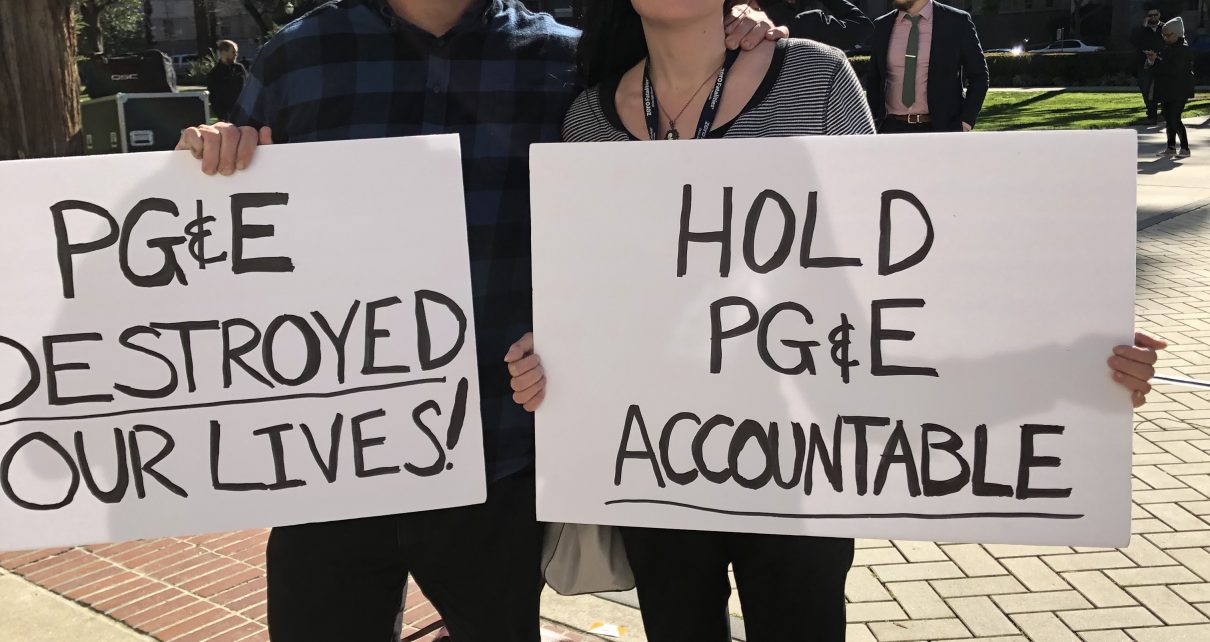
Camp Fire Victims, Randy Viehmeyer, Lisa Butcher. (Katy Grimes for California Globe)
Erin Brockovich to California Politicians: ‘Take Control of the Runaway PG&E Monopoly’
Lawyers for fire victims ask if the massive utility needs to be broken up
By Katy Grimes, January 23, 2019 1:00 am
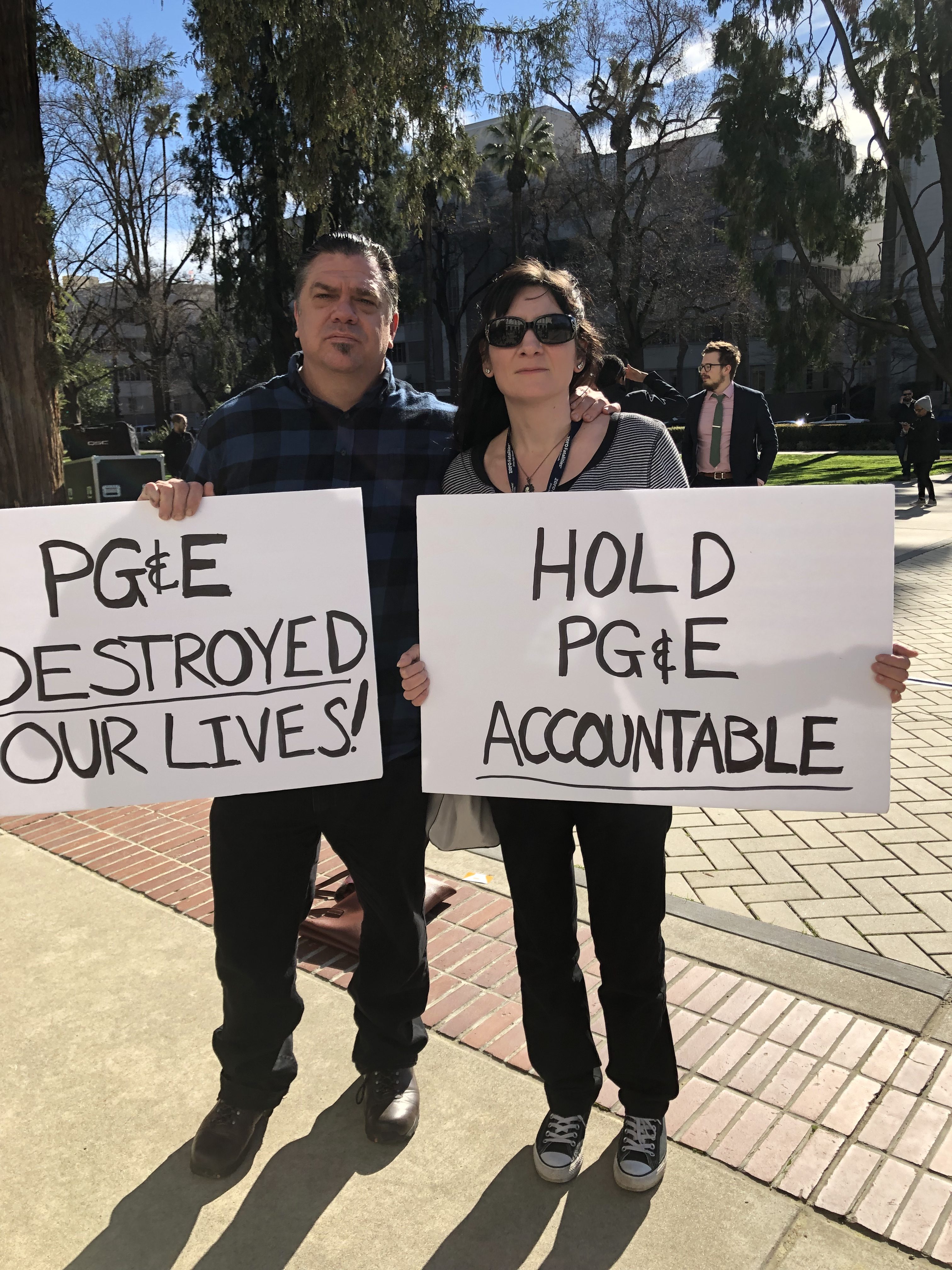
Activist Erin Brockovich, who took on mega-utility Pacific Gas & Electric in the 1990s for the contamination of drinking water in Southern California, traveled to the State Capitol Tuesday to urge California lawmakers not to let the utility file for Chapter 11 bankruptcy. She and attorney and former State Senator Noreen Evans warned that a bankruptcy business reorganization would harm wildfire victims, while protecting PG&E with a bailout.
Thousands of Northern California wildfire victims are growing concerned about PG&E’s threat of bankruptcy, and what will happen to their fire claims and lawsuits.
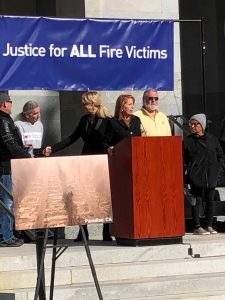
However, it became clear during the press conference that the problem is complicated with PG&E, which has more than $70 billion in assets according to attorney Evans. Add in to the mix the historically troubled California Public Utilities Commission which is supposed to regulate and oversee the utility, lawmakers who cannot ignore campaign contributions from the utility company, thousands of fire victims from fires in 2016, 2017 and 2018, and a potential bankruptcy judge who would oversee the massive Chapter 11 business reorganization, and weigh PG&E’s assets and liabilities of the case.
PG&E Bankruptcy Threat
PG&E recently announced it plans to file for Chapter 11 bankruptcy protection by the end of January because of the estimated $30 billion in potential legal liabilities from the 2017 wine country fires and 2018 Camp Fire. The town of Paradise, CA was ravaged by fire, and 86 people were killed, making it the deadliest fire in California history.
Former State Senator Noreen Evans (D-Santa Rosa), is now an attorney with Mauro O’Neill Archer LLC, the law firm representing wildfire survivors against PG&E. Evans said her law firm represents 4,000 fire victims, who are each owed “tens of thousands of dollars,” by PG&E for fire damages to their homes, businesses and properties.
“PG&E is a corporation with more than $70 billion in assets,” said Evans in a recent news article by ABC News7. “It has a guaranteed income stream of $1 billion a year. PG&E has the assets and means to pay its victims.”
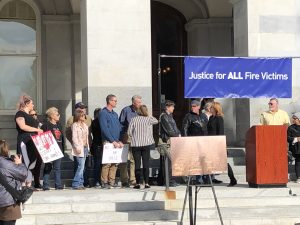
“Evans speculates that PG&E is really looking for a way to restructure its debts. ‘By saying they might go bankrupt, they’re trying to discourage people from suing.'”
The number of fires PG&E reported its equipment sparked has risen in recent years despite increasing tree trimming and fire reduction programs.
California law makes utilities responsible for all fires ignited by their equipment, even if they weren’t negligent, which is what lead to the legislative deal over the 2016 fires, which Evans addressed. SB 901 does not apply to the 2018 fire victims, Evans said. SB 901 by Sen. Bill Dodd (D-Napa) changed the rules governing the liability of utility companies responsible for causing wildfires because of electrical equipment failures, shifting billions of dollars of recovery costs to ratepayers from utility shareholders.
Many in the state saw SB 901 as a bailout of PG&E, which had threatened to file bankruptcy over the liabilities from the 2016 wildfires.
Attorney Evans said threatening bankruptcy has become the “go-to” option for PG&E, “which has become too powerful and too big for its britches.”
“We are here to ask the Legislature to treat the 2018 wildfire victims fairly,” Evans said. “Chapter 11 doesn’t mean the lawsuits go away, but the victims become unsecured creditors.”
Both Evans and Brockovich discussed how the State Legislature has allowed PG&E to become a monopoly over the years, saying the ratepayers have become its “16 million forced customers.”
“Since the state allowed the monopoly, the Governor must have a say in how PG&E moves forward and acts,” Brockovich said.
Brockovich and Evans urged state lawmakers and the PUC to adopt strict oversight of PG&E, given the utility’s lengthy history of covering up negligence.
“Be at the head of the table and take control of this runaway monopoly,” she said.
Evans said the Legislature can take away the PG&E monopoly, and “the PUC retains the ability to say ‘yes’ or ‘no’ to PG&E. “The Legislature can pass emergency legislation,” Evans said after the press conference. “I’m hearing from the Legislature that it’s getting fed up with PG&E and doesn’t want to pass anything that would necessarily help PG&E.”
The Camp Fire Victims
Camp Fire victims Lisa Butcher and Randy Viehmeyer attended the press conference. They lost their rental home, and everything in it, including their fireproof safe which held all of their important legal documents. “We have no identities now,” Randy said. They, along with 600 other families are currently living at the Chico fairgrounds emergency shelter. “We are about to be kicked out,” Lisa said. “The Silver Dollar Fair is coming to town and they are closing down the shelter. They act as if it’s more important; they don’t care about the families who are homeless.”
“There are a lot of elderly people there,” Lisa continued. “They are just telling us to leave the area, or leave the state.”
“We can’t leave,” Randy said. “We are still sifting through the ashes of our home.”
Randy and Lisa, whose grandparents have lived in Paradise since the 1970’s, don’t have insurance. Lisa’s mother lost everything in the fire. “FEMA isn’t much help either,” Randy said. The couple asked where all of the emergency funding from the federal government and special state funds is going. “Because it’s not making it down to the people who need it the most.”
- ICE is Living Rent Free in California Democrats’ Heads - January 30, 2026
- U.S. Department of Ed Finds California Violated Federal Law Hiding Students’ ‘Gender Transitions’ from Parents - January 29, 2026
- Sacramento Mayor Kevin McCarty Proposes Property Tax on ‘High-Priced’ Homes to fund Homeless Housing - January 29, 2026




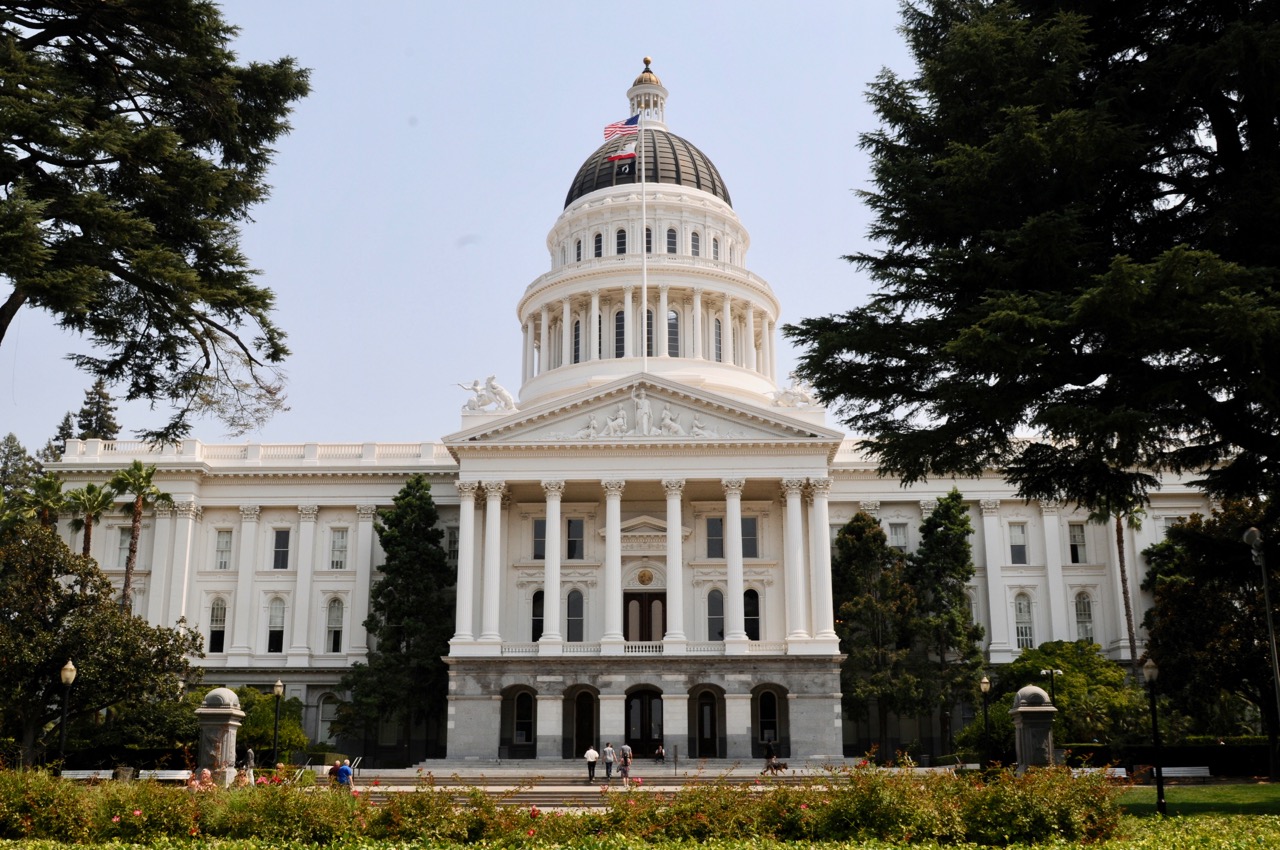
Is anybody investigating PG&E’s request to take care of the Paradise ignition site but was denied entry by CA agencies as being too disruptive to the environment? No one has any real love for PG&E as many of us have been gouged repeatedly by their rates and wink-nod actions with the CPUC, but let’s dig a little deeper into this. California regulations will most likely be the root culprit of any catastrophic disaster in this state with the goal of driving independent rural citizens out of the wilderness and into the concrete enclaves.